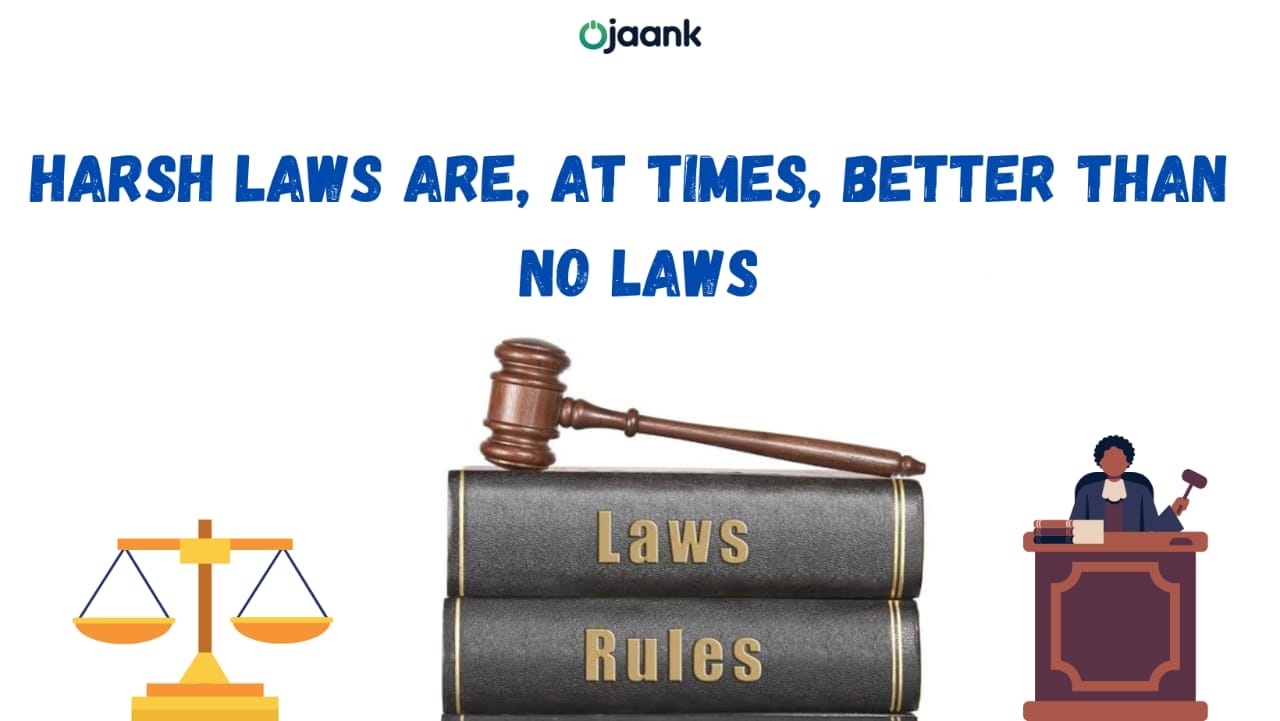Harsh Laws are, at times, Better than No Laws

Laws are the backbone of any civilized society, providing a framework for order, justice, and the protection of individual rights. However, the question of whether harsh laws are better than having no laws at all is a contentious and complex issue. In this essay, we will explore the advantages and disadvantages of having harsh laws, weighing them against the potential chaos and injustice that can arise in the absence of any legal framework. While there are undeniable drawbacks to harsh laws, they can serve as a necessary evil in certain circumstances, maintaining social order and ensuring that individuals are held accountable for their actions.
To understand the significance of laws, we must first recognize their primary functions in society. Laws serve as guidelines for acceptable behavior, establishing a moral and ethical standard for citizens to follow. They define the rights and responsibilities of individuals, outlining the boundaries within which people can exercise their freedom. Laws also provide a mechanism for resolving disputes, enforcing contracts, and administering justice.
One of the primary arguments in favor of harsh laws is their potential to act as a powerful deterrent. Harsh penalties and strict enforcement can dissuade individuals from engaging in criminal activities or violating societal norms. For instance, stringent drug laws in some countries have been successful in reducing drug-related offenses due to the fear of severe punishment. In such cases, harsh laws create a disincentive for potential lawbreakers, contributing to overall social order and safety.
Harsh laws often play a crucial role in preserving public safety. In cases involving violent crimes, terrorism, or threats to national security, strict laws are essential to protect the welfare of the general population. For instance, anti-terrorism laws with severe consequences are necessary to combat extremist groups and safeguard the lives of innocent citizens. Without such laws, the potential for chaos and harm would increase significantly.
Laws, including harsh ones, play a vital role in maintaining social cohesion. They establish a shared framework of values and norms that help individuals coexist peacefully in a diverse society. Without laws that ensure respect for the rights and dignity of others, conflicts can escalate, leading to divisions and social unrest. Harsh laws can act as a safeguard against those who would disrupt social harmony through criminal activities or hate speech.
Harsh laws also contribute to accountability and justice. They ensure that individuals who commit serious crimes face appropriate consequences for their actions. This not only serves as a form of retribution for victims but also as a means of deterrence for potential offenders. The existence of harsh penalties sends a clear message that certain behaviors will not be tolerated, helping to maintain a just and orderly society.
While there are valid arguments in favor of harsh laws, it is essential to acknowledge their potential drawbacks. The most significant concern is the risk of over-policing and the infringement of individual rights. Harsh laws can be used to suppress dissent, discriminate against certain groups, and stifle free speech. Excessive punishment can lead to an unjust and oppressive legal system that does more harm than good.
Harsh laws can disproportionately affect marginalized communities, leading to discrimination and injustice. For example, mandatory minimum sentences for drug offenses in some countries have resulted in the mass incarceration of minority populations, perpetuating cycles of poverty and crime. In such cases, the implementation of harsh laws can lead to systemic inequalities and a loss of trust in the justice system.
Strict laws can also inhibit personal freedom and autonomy. Excessive government control and surveillance can erode privacy rights and discourage individual expression. Citizens may become hesitant to voice their opinions or engage in activities that challenge the status quo, fearing reprisals under harsh legal regimes. This erosion of personal freedom is a significant concern in societies where individual liberties are highly valued.
Another issue with harsh laws is the potential for abuse of power by those in authority. When the legal system allows for severe punishments, there is a risk that individuals may be unfairly targeted or falsely accused. The fear of being wrongly convicted and subjected to harsh penalties can create a climate of distrust and fear among the population.
To strike a balance between having harsh laws and ensuring fairness, it is crucial to have a transparent and accountable legal system. Checks and balances, an independent judiciary, and safeguards for individual rights are essential components of a just legal framework. Additionally, the severity of punishments should be proportionate to the severity of the crime, and rehabilitation and reintegration programs should be available for offenders.
In conclusion, the debate over whether harsh laws are better than no laws is a complex and nuanced one. While harsh laws can serve as a deterrent, preserve public safety, and maintain social order, they also carry the risk of injustice, discrimination, and an erosion of personal freedom. The key lies in striking a balance between the need for law and order and the protection of individual rights. A just legal system with clear checks and balances can help ensure that harsh laws are applied fairly and responsibly. Ultimately, the question is not whether harsh laws are better than no laws, but rather how to create a legal system that upholds justice and the rule of law while respecting the rights and dignity of all citizens.